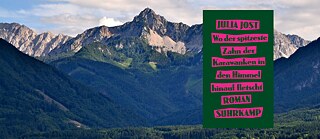In her explosive debut novel, Austrian author Julia Jost describes growing up in 1990s Carinthia, a place caught between its Nazi past and right-wing populist present.
Rural Carinthia, 1994: an eleven-year-old girl is hiding under a big lorry. The contents of her family home are being loaded up ready for a move to another village and a larger house, partly because more space is needed to accommodate her mother’s shopping addiction. Meanwhile, the first-person narrator in Julia Jost’s debut novel Hide and Seek / Wo der spitzeste Zahn der Karawanken in den Himmel hinauf fletscht is playing hide-and-seek with her friend Luca, who is counting down – in Bosnian – from one hundred to zero. The same age as the narrator, Luca is the daughter of refugees from the Bosnian War.From her hiding place, the narrator observes her surroundings and loses herself in memories and daydreams. Jost chose this childish perspective “from below” because children look at the world less judgementally and more naively, explained the author in a Deutschlandfunk interview. Nonetheless, one can sense the child’s adult alter ego hovering behind her in the wings.
Deceitful, malicious and nonsensical
The girl is growing up in a seemingly idyllic setting – the natural environment at least is certainly harmless: “To talk about this fauna and flora being deceitful or malicious would be nonsensical.” The situation is quite different when it comes to people. The novel is densely populated. There are stories, most of which are not especially flattering, about all the neighbours and relatives who come to watch or help with the move.We have for instance the “Stubenhof grandparents”. Rather than providing support during the move, Stubenhof granny wants to complain loudly and in Carinthian dialect about the sale of the Gratschbach farm, which is the name of the narrator’s family home: “You’ll be killing dead Louis a second time! Murderers, that’s what you are!” We also discover that Stubenhof granny is proud to this day that “ninety-nine point eight three percent of people voted for the Anschluss” (Austria’s annexation by Nazi Germany) in Carinthia in 1938. She is also proud to be in possession of an SS honour dagger and her Aryan certificate.
The headstrong Stubenhof grandpa initially left to be a forest worker in the “Reich”, but returned home after the war began with a copy of Heidegger’s Being and Time in his luggage, built the Gratschbach farm and later spent most of his time reading this work – in the side room of the inn that was run mainly by his wife. It remains unclear whether reading Being and Time had anything to do with his later suicide, which was as bizarre as it was puzzling. The many different versions of her grandfather’s demise fan the flames of the narrator’s vivid imagination; she once imagines her grandpa being like a fish floundering and twitching on land whose “only chance of survival was to urinate a puddle into which to plunge”.
A fateful SS honour dagger
The dagger, inscribed with the Waffen-SS motto “Meine Ehre heißt Treue” (My Honour Is Loyalty), plays a fateful role in a different context. A group of children is playing with it near a well, the dagger falls in, Franzi, who has moved to the area from elsewhere, is lowered down into the well on a rope but the fire brigade can only recover her dead body, the dagger in her stomach – “an ominous mystery”.The narrator’s father begins at some point to deal in lorries, managing to sell 50 of them in the former Yugoslavia. As a result, the family becomes so rich that her parents even run out of ideas for how to spend the money. The only reason her father is so successful however is because Gernot Pfandl, fraternity member, fireman and mayor (his election slogan being “A man who gets things done!”), introduces him to “the right people”. And it goes without saying that these right people belong to the “right” party, which in 1990s Carinthia is the right-wing populist Freedom Party of Austria (FPÖ) led by Jörg Haider, upon whom the character of Gernot Pfandl is based.
A lavish panopticon
Furthermore, we have the local inn, the centre of village social life and a meeting place for Nazis young and old. With her red patent shoes, landlady Marlene Wallach has a siren effect on men and sometimes takes them to bed. Then we have the sanctimonious parish priest Don Marco, who likes to take confession at the inn, a village communist by the name of Focknhocker, and Beuschelwieser, a watchmaker from Vienna and likewise a fraternity member who likes to check on people’s wellbeing by asking them: “everything in German hands?”.Julia Jost provides a lavish panopticon of rural society. The novel is written with great linguistic and storytelling gusto and is rousing, imaginative, bawdy and witty, with frequent splashes of dialect. The girl’s first tender love for her friend Luca serves as the counterpoint to the rough and loveless setting.
Critics have placed Jost’s debut firmly in the tradition of Austrian anti-Heimat novels, though the author herself is not at all happy about being pigeonholed in this way. People compare her with Elfriede Jelinek or indeed Helena Adler. Thomas Bernhard must of course also be mentioned in this context, who wrote for example in his novel Gargoyles (1967) that city crimes are nothing compared to rural crimes, and that in the countryside “brutality and violence are the foundation”. After reading Julia Jost’s novel, one has enough stories and images in one’s head to see what he means.
Julia Jost: Wo der spitzeste Zahn der Karawanken in den Himmel hinauf fletscht. Roman
Berlin: Suhrkamp, 2024. 231 p.
ISBN: 978-3-518-43167-2
You can find this title in our eLibrary Onleihe.
June 2024
